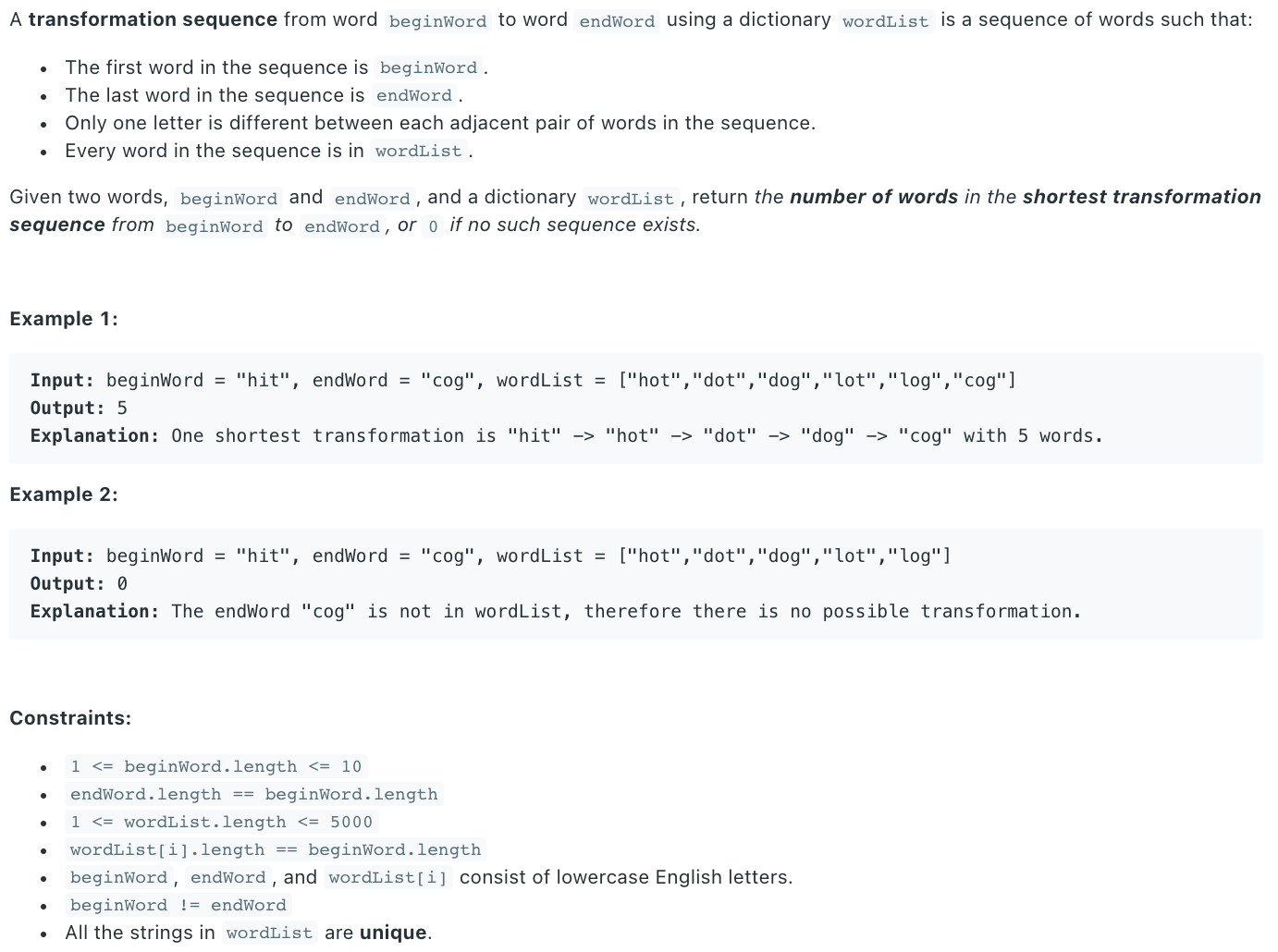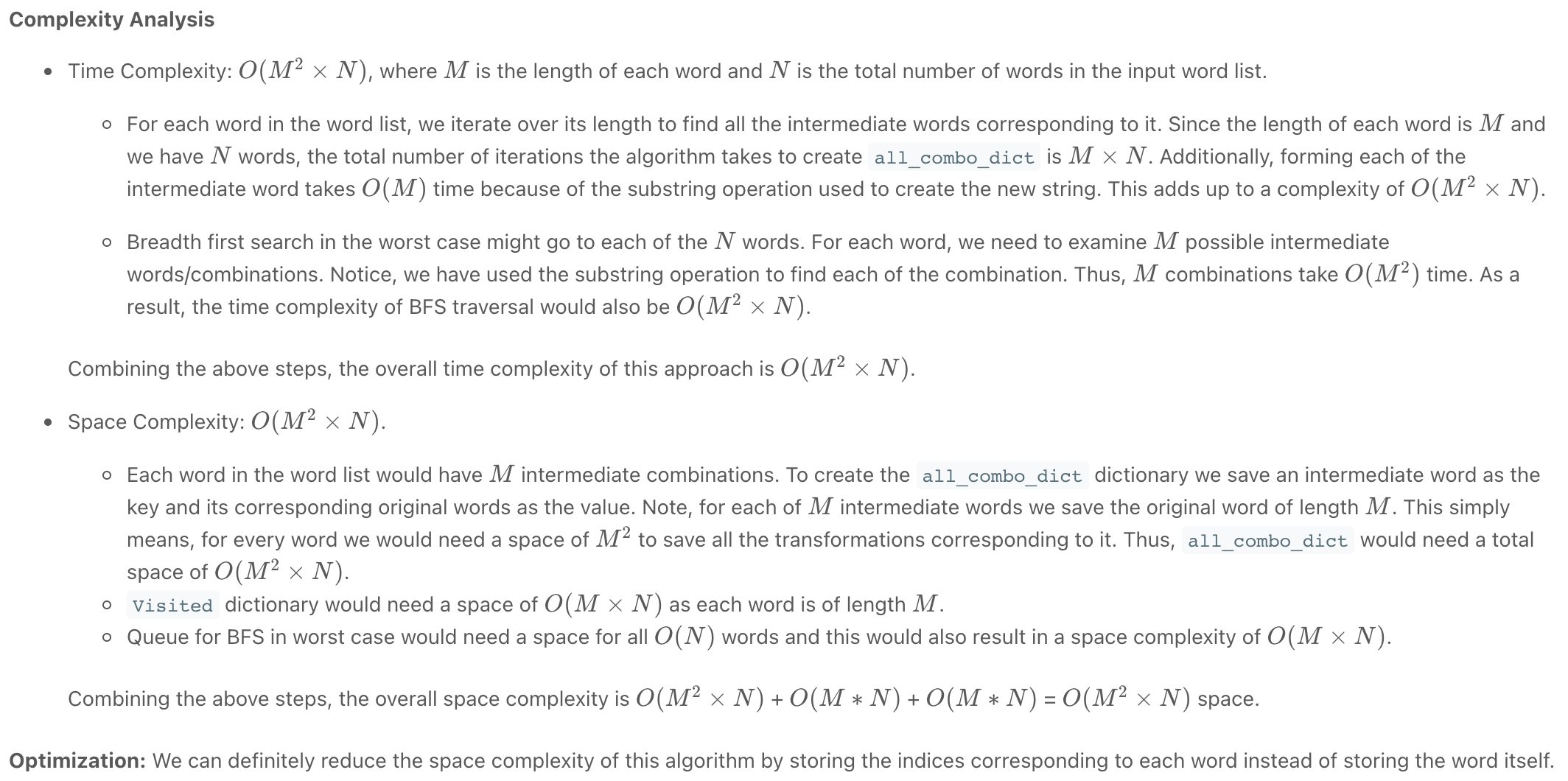Word Ladder

# Solution
Let be the number of words and be the length of each word.
It's not necessary to store all transformations for every word in dict. There are 2 possible approaches to find a word's possible next_words:
- generate all
next_wordsw/ only 1 different char fromword - check in
dictif every element is 1 char different fromword
We choose the 1st b/c 26 * len(word) is usually less than len(dict).
Note that dict should be a HashSet; otherwise the next_word not in dict check is quite inefficient.
Helper method get_next_words outputs an array of all possible next_words of current word. Its time complexity is b/c there are iterations, slicing a string causes time, and the size of English alphabet is . The space complexity is .
Thus, the total complexity is:
Complexity
time:
space:
vis can be many data structures.

# Layered BFS w/ HashSet
For each layer of BFS, we increment res by .
def ladderLength(self, beginWord: str, endWord: str, wordList: List[str]) -> int:
dct = set()
for word in wordList:
dct.add(word)
queue = [beginWord]
vis = set([beginWord])
res = 0
while queue:
res += 1
for _ in range(len(queue)):
word = queue.pop(0)
if word == endWord:
return res
for next_word in self.get_next_words(word):
if next_word not in dct or next_word in vis:
continue
queue.append(next_word)
vis.add(next_word)
return 0
def get_next_words(self, word):
words = []
for i in range(len(word)):
left, right = word[:i], word[i+1:]
for char in 'abcdefghijklmnopqrstuvwxyz':
if word[i] == char:
continue
words.append(left + char + right)
return words
2
3
4
5
6
7
8
9
10
11
12
13
14
15
16
17
18
19
20
21
22
23
24
25
26
27
28
29
30
# BFS w/ HashMap
Now BFS is no longer layered, but turn vis into a hashmap to store number of transformations.
def ladderLength(self, beginWord: str, endWord: str, wordList: List[str]) -> int:
dct = set()
for word in wordList:
dct.add(word)
queue = [beginWord]
vis = {beginWord: 1}
while queue:
word = queue.pop(0)
if word == endWord:
return vis[word]
for next_word in self.get_next_words(word):
if next_word not in dct or next_word in vis:
continue
queue.append(next_word)
vis[next_word] = vis[word] + 1
return 0
def get_next_words(self, word):
words = []
for i in range(len(word)):
left, right = word[:i], word[i+1:]
for char in 'abcdefghijklmnopqrstuvwxyz':
if word[i] == char:
continue
words.append(left + char + right)
return words
2
3
4
5
6
7
8
9
10
11
12
13
14
15
16
17
18
19
20
21
22
23
24
25
26
27
# Improved BFS
The following solution gets rid of helper function get_next_words and use queue to store the mappings from word to number of transformations.
def ladderLength(self, beginWord: str, endWord: str, wordList: List[str]) -> int:
dct = set()
for word in wordList:
dct.add(word)
queue = [(beginWord,1)]
word_len = len(beginWord)
while queue:
word, cnt = queue.pop(0)
if word == endWord:
return cnt
for i in range(len(word)):
left, right = word[:i], word[i+1:]
for char in 'abcdefghijklmnopqrstuvwxyz':
if word[i] != char:
next_word = left + char + right
if next_word in dct:
queue.append((next_word, cnt+1))
# remove next_word to avoid cycle and thus infinite loop
dct.remove(next_word)
return 0
2
3
4
5
6
7
8
9
10
11
12
13
14
15
16
17
18
19
20
21
22
Bidirectional BFS
# Bidirectional BFS

from collections import defaultdict, deque
class Solution:
def __init__(self):
self.length = 0
# Dictionary to hold combination of words that can be formed,
# from any given word. By changing one letter at a time.
self.all_combo_dict = defaultdict(list)
def visitWordNode(self, queue, visited, others_visited):
current_word, level = queue.popleft()
for i in range(self.length):
# Intermediate words for current word
intermediate_word = current_word[:i] + "*" + current_word[i+1:]
# Next states are all the words which share the same intermediate state.
for word in self.all_combo_dict[intermediate_word]:
# If the intermediate state/word has already been visited from the
# other parallel traversal this means we have found the answer.
if word in others_visited:
return level + others_visited[word]
if word not in visited:
# Save the level as the value of the dictionary, to save number of hops.
visited[word] = level + 1
queue.append((word, level + 1))
return None
def ladderLength(self, beginWord: str, endWord: str, wordList: List[str]) -> int:
if endWord not in wordList or not endWord or not beginWord or not wordList:
return 0
# Since all words are of same length.
self.length = len(beginWord)
for word in wordList:
for i in range(self.length):
# Key is the generic word
# Value is a list of words which have the same intermediate generic word.
self.all_combo_dict[word[:i] + "*" + word[i+1:]].append(word)
# Queues for birdirectional BFS
queue_begin = deque([(beginWord, 1)]) # BFS starting from beginWord
queue_end = deque([(endWord, 1)]) # BFS starting from endWord
# Visited to make sure we don't repeat processing same word
visited_begin = {beginWord: 1}
visited_end = {endWord: 1}
ans = None
# We do a birdirectional search starting one pointer from begin
# word and one pointer from end word. Hopping one by one.
while queue_begin and queue_end:
# One hop from begin word
ans = self.visitWordNode(queue_begin, visited_begin, visited_end)
if ans:
return ans
# One hop from end word
ans = self.visitWordNode(queue_end, visited_end, visited_begin)
if ans:
return ans
return 0
2
3
4
5
6
7
8
9
10
11
12
13
14
15
16
17
18
19
20
21
22
23
24
25
26
27
28
29
30
31
32
33
34
35
36
37
38
39
40
41
42
43
44
45
46
47
48
49
50
51
52
53
54
55
56
57
58
59
60
61
62
63